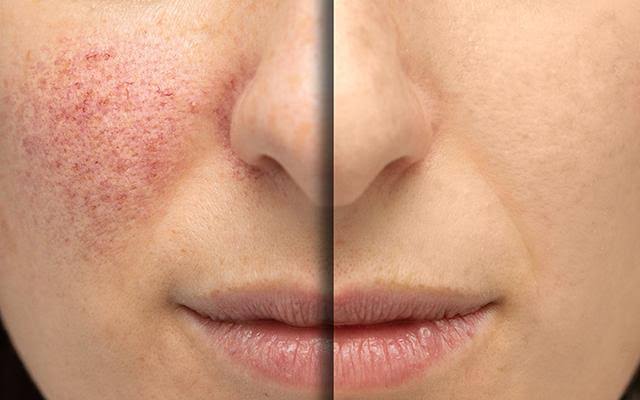
The 3 R’s of Skin Treatment
Repair: is the first step in skin treatment. Everyone has a different skin concern – discoloration, redness, breakouts, dryness or wrinkles, reactive skin. These are

Females are more likely to suffer from rosacea, however, when rosacea does occur in males it is often more severe and advances more rapidly. The causes in either sex, can be genetic predisposition, environmental stress, vascular or inflammatory damage/disease.
Rosacea refers to a range of symptoms that generally begin with some blushing or modest redness on the cheeks, nose, forehead and chin. As the condition progresses, symptoms typically worsen to include persistent redness of the nose and cheeks. Small blood vessels begin to grow (Telangiectasia), particularly on the nose, and become increasingly visible. Diffused redness may become permanent, often worsening after exercise, consumption of coffee or alcohol or other factors (see below). Redness is also an indicator of collagen loss, which leads to thin skin density and weakened support of the capillary network.
Additionally, vesicles (pustules or papules) may develop in these later stages; a factor which has led to the misdiagnosis of rosacea as “adult acne”.
While there is currently no cure per se for rosacea, its symptoms can be managed quite effectively. Cellular health is very important to improving the condition. In addition to some of my to go to products below, a dietary intake of essential fatty acids such as Omega 3 & 6 is beneficial.
Corneotherapeutic treatments aim to stabilise the disordered skin barrier over the course of the long term. The skin barrier, when strong and intact, can largely stop external rosacea triggers such as environmental stress, chemicals and germs.
As the skin barrier is stabilised, the likelihood of inflammatory processes in the deeper skin layers recurring decreases. Instead, they will gradually regress and you will notice visible improvements to the condition. This treatment is called the “outside-in” strategy. In summary, a stronger skin with intact lipid bilayers will be better able to prepare itself to utilize anti-oxidants to scavenge free radicals. In short, it can obviate all that rosacea can throw at it.
The skin care products you use should be free of perfumes, preservatives, emulsifiers, mineral oils and silicones, as these substances have the ability to further aggravate a sensitive, inflamed skin condition such as rosacea. Fatty acids, ceramides and phytosterols in combination with saturated phosphatidylcholine and triglycerides, allow skin-identical physical structures and displays excellent tolerance properties. DMS base creams achieve this – hence Dermaviduals is a perfect match for your skin.
The water used for cleansing should be lukewarm and free from hardening components such as calcium and magnesium ions in order to prevent a salt precipitation of the fatty acids of the skin barrier, which can further destabilise the barrier.
Cleansing products should be free from preservatives (sensitizing potential) and re-fattening substances in the form of silicones or surface-active compounds. Appropriate preparations are gels with pH values up to a maximum of 7, without lauryl sulfate or lauryl ether sulfate (due to their irritating potential).
In summary, if rosacea is a concern for you, the use of Dermaviduals in conjunction with the Dermal Roller for home use is your solution. It is very important to do this under professional guidance. Contact us for further advice…
NOTE: mechanical peelings are NOT recommended for rosacea prone skin or similar skin problems that affect superficial connective tissue. This will cause more disruption to the acid mantle where a compromised bilayer already exists.

Repair: is the first step in skin treatment. Everyone has a different skin concern – discoloration, redness, breakouts, dryness or wrinkles, reactive skin. These are

Pure Skin Clinic in Auckland aligns bespoke Dermaviduals products with Corneotherapy for a skin care system that works. The main principle of Corneotherapy believes that
© 2024 Pure Skin Clinic. All Rights reserved.